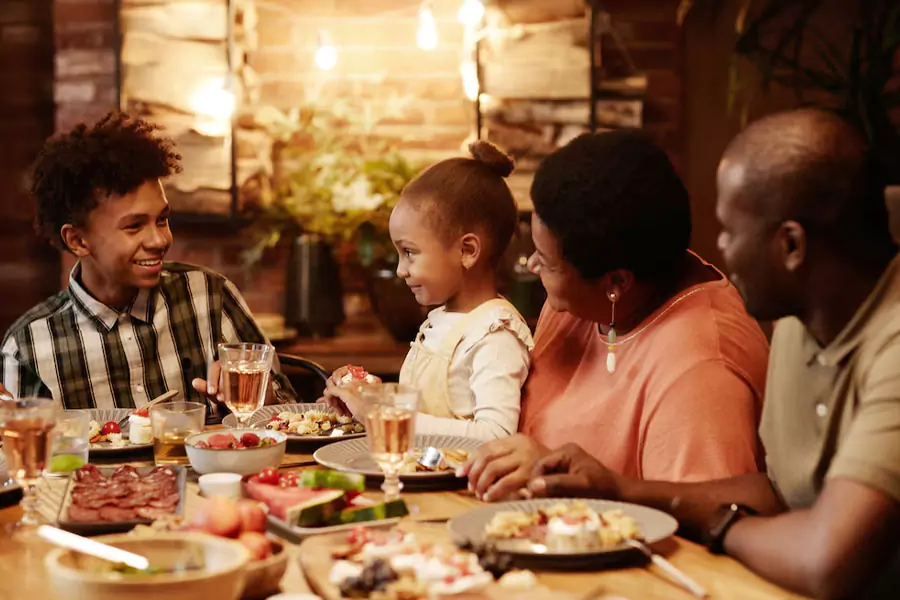Schedule Appointment
Schedule Appointment

Sunday dinners within African American families are rich in culture and tradition. Sunday dinner is more than just food; it’s family, heritage, and creating lifelong connections. Sunday dinner for most African Americans is not just a meal—it’s a ritual, a celebration of life, and a time when family ties are strengthened and validated. The culture is rich in the past with every dish at the table with a story about strife, survival, and victory.
Sunday dinner in African American families goes centuries back, from the American South’s slaves, and it continues to this day. Even as the world outside their doors changes, African American families cling to the importance of gathering on Sundays, eating, and sharing stories and experiences. Plates like the Fruit Ladies plates, Friday Night’s Card Game plates, and First Generation College Student plates are visual symbols that pay tribute to the tradition of Sunday dinners and the memories created.
The tradition of Sunday dinner in African American families dates back to the era of slavery. Slave households were typically fragmented and denied the luxury of gathering. However, on Sundays, the exploitative work schedule of the plantation economy would ease somewhat, and slaves would be granted some time to gather, socialize, and cook. Sunday had become the day when family members would come together, share whatever little they possessed, and live despite hardships.
The food, typically simple but lovingly and creatively prepared, made the available money rich and satisfying. The occasion was for coming together to celebrate in defiance of the open oppression. Today, Sunday dinner in African American homes continues to be the momentum of this survival.
Nowadays, Sunday lunch remains where families can take a break from the week’s stresses, bond with one another, and enjoy their shared heritage. As African American families migrated during the Great Migration and scattered across the country, the tradition evolved but still centered on gathering and celebrating.
No Sunday dinner is complete without the grub—soul food. Soul food is born of African American ingenuity and determination, deeply rooted in the flavor of the South. It includes fried chicken, collard greens, macaroni and cheese, sweet potato pie, and cornbread. The food on the table is more than sustenance; it’s a testament to love, culture, and family tradition.

The Fruit Ladies plates tastefully convey this tradition, featuring images of women carrying food—occasionally fruits and vegetables—symbolizing the care and dedication that goes into cooking for people one cares about. The plates are a pictorial celebration of the women who have long been the bearers of the cooking torch in African American households, from grandmothers to mothers to daughters.
Food is its language at these gatherings, and each dish is a narrative. Each recipe passed down through generations is a piece of history. Whether it’s the secret ingredients in the macaroni and cheese or the technique for frying up the perfect chicken, these foods carry the memories of past generations so that culture and tradition are never lost.
Sunday dinner is more than just food—it’s a time for bonding. When everyone sits at the table together, it’s a time for conversation, to share news, reminisce about the week, and pass along family legend. The older family members have a significant role in sharing stories and imparting wisdom with younger members so that the past is never forgotten.

The Friday Night’s Card Game plates creatively portray another essential aspect of African American family life—the time spent laughing, strategizing, and sitting together as a unit. The games typically happen following Sunday dinner or the weekend get-togethers leading to Sunday. Socialization at these times is a way in which families unite, share the company of one another, and embrace the common history and happiness of their group. The arguments, badinage, and joking that go around the table over a game of spades or dominoes usually remain on the Sunday dinner agenda as experiences and stories are swapped and cherished.
A sense of community during these gatherings exists that transcends the immediate family. Sunday dinners among African Americans involve more than just immediate family members but extended family, close friends, and even neighbors. These gatherings become a meeting place that redefines “family” to be more than just those related by blood, but a sense of mutual care and concern.
While Sunday dinners are steeped in tradition, they also impart cultural knowledge to younger generations. Over the last few years, Sunday dinners have celebrated milestones and achievements as African American families continue to grow and become larger. Whether it is the report of a new job, home, or graduation, Sunday dinners are necessary for expressing family pride.

First Generation College Student plates invoke this transformed tradition since they are icons of the dreams, pride, and perseverance of families who worked to make their first-generation college students possible. The plates, usually adorned with books, diplomas, and academic icons, signify the importance of social mobility and education in African American communities. On Sunday nights, family members gather regularly to commemorate scholarly achievements and transmit the values of education and diligence as part of their enduring legacy.
For many African American families, the graduation of a child or grandchild from college is a moment of profound happiness—one that is celebrated with a big Sunday dinner, where tales of struggle, perseverance, and achievement are told over a table spread of home-cooked food.
The importance of Sunday dinner in African American households cannot be overemphasized. Sunday dinner is a moment of togetherness, reflection, and celebration. It helps to reinforce a sense of continuity—uniting the past, present, and future in food, words, and love.
As years pass and African American families are scattered across the country, the Sunday dinner tradition remains—a bond that keeps family members together despite physical distance. At these times, members are reminded of their shared past and their people’s ongoing strength.
The Fruit Ladies plates, Friday Night’s Card Game plates, and First Generation College Student plates are not only beautiful pieces of art—they are symbols of the values that Sunday dinners represent. They are visual reminders of the traditions that continue to shape the African American experience and the importance of family bonds that will endure for generations.
Sunday dinners in African American communities are so much more than meals. They are foods that celebrate a people’s strength, resilience, and love. They are either by the comforting taste of a homestyle meal, the warmth of family conversation, or the joy of reliving memories, and they are a vital part of the African American cultural landscape. As families sit around the table, they preserve the traditions handed down from generation to generation—bridging the past and the future, Sunday by Sunday.